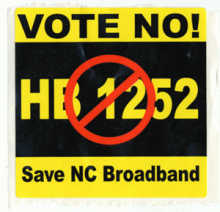"My issue is that cities should not be competing with private enterprise." - Senator Hoyle of North Carolina
Given this Senator's opposition to the public sector competing with the private sector, I assume he is fighting just as hard to
shut down the libraries (or have Borders and Barnes and Noble neglected to donate enough to his candidacy?), as well as the schools (there are private schools), and the police (security guards are readily available on the private market). This is not merely a snarky attack on someone with whom I disagree, but a nod to the very serious problem that these massive companies can push their protectionist legislation everywhere.
Senator Hoyle, the driving force behind using state law to protect incumbent providers like Time Warner and AT&T from competition in broadband admitted his motivation at the
beginning of a video from the recent committee hearing available on Stop the Cap!.
In it, the Senator also makes it clear that he is either unaware of what his legislation does or he is lying about it when he claims it does not affect the communities that have already built the most state-of-the-art networks in the state. His legislation would severely handicap each of them from upgrading despite his false claims that they are exempted. The post on Stop the Cap offers more background and discussion and I encourage readers to check it out.
As usual, I'll add my own short commentary about it. I
previously explained why this bill's requirement for cities to use General Obligation Bonds is terrible policy.
Senator Hoyle claims the town of Mooresville did not know what they were doing. Listening to his discussion, it is abundantly clear that he doesn't know what he is talking about. I spoke with folks from Mooresville before they bought the cable system and I have spoken with them since. They got screwed by Adelphia and Time Warner in the deal and have had to take on additional debt.




